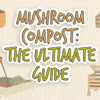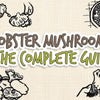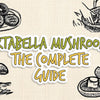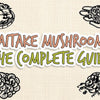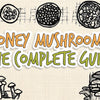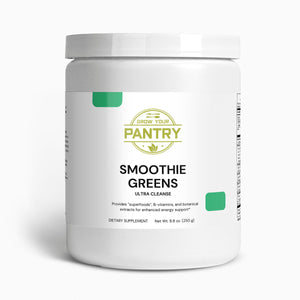Mushroom Compost: The Ultimate Guide
Mushroom compost is a variety of slow-release organic plant fertilizer that’s often prepared using poultry or horse manure mixed with corn hulls, straw, and hay. Mushroom compost is rich in terms of nutrient content and is primarily used to grow mushrooms commercially. Mushroom compost can also be used to amend poor soils to increase nutritional count and aeration rate. This guide will take you through the mushroom making process, its use, benefits, and side effects, as well as factors to consider before using mushroom compost.
What Is Spent Mushroom Compost?
Spent mushroom compost is often sold by mushroom farmers after the compost seizes to produce viable mushrooms. However, the mushroom compost is still rich in essential nutrients and is often used to topdress the soil in vegetable gardens. Further reading material: link.
Mushroom compost - making can also vary depending on the raw materials availability, where you can use other organic matter available. These include wheat or rye straw, peat moss, used horse bedding straw, chicken manure, cottonseed or canola meal, grape crushings from wineries, soybean meal, potash, gypsum, urea, ammonium nitrate, and lime.
Why Use Mushroom Compost?
1. Provides The Right Mix Of Nutrients For Your Mushrooms
Mushroom compost is packed full of essential nutrients from nitrogen to minerals such as 0.67 % phosphate (phosphorous) and 1.24 % potash (potassium), as well as other plant nutrients such as calcium (2.29 %), magnesium (0.35 %), and iron (1.07 %).
2. Enriches The Soil
Mushroom compost can be used to enrich poor soil as it introduces healthy microbial life to the soil as well as adding the nutrients which are slowly released into the soil over time. The presence of fibrous material in the mushroom compost provides increased aeration in the soil, which allows it to retain water at a healthy rate.
3. Improve The Soil’s Water Holding Capacity
Adding mushroom compost to the soil will increase its aeration rate - these air pockets allow water to freely pass through and soak in the soil. As a result, the soil is able to retain more moisture, even during dry conditions.
4. Increases Aeration
Mushroom compost increases the aeration rate of the soil, which in turn promotes root growth and increased photosynthetic rate and chlorophyll content in the plant. This has a significant impact on the plant growth rate and reducing the plant death rate. Suppose you intend to use mushroom for its original use - growing mushroom. In that case, the increased aeration allows the mycelium to burrow through the mushroom compost much faster, which increases the mushroom growth rate.
5. Eliminating Harmful Microorganisms
The increased microbial activity during the decomposition phase leads to increased heat production as they break down the nutrients. The heat in turn, kills off all harmful pathogens and microorganisms in the compost. This results in a high population of useful bacteria in the mushroom compost- these go to work immediately after mixing the compost into the soil and eliminating most of the soil’s harmful microorganisms.
What Can You Grow Using Mushroom Compost?
- Cabbage
- Cauliflower
- Broccoli
- Kale
- Brussel Sprouts
- Kohlrabi
Further reading material: rhs.org
Benefits Of Using Spent Mushroom Compost
1. Increased Nutrient Availability
Mushroom compost is packed full of essential nutrients from nitrogen to minerals. These are essential in increasing harvests and ensuring all your crops remain healthy throughout the growth phase.
2. It’s Versatile
There’s no shortage of ways you can use mushroom compost around the garden - from topdressing vegetables to enriching poor quality soil. Its overly alkaline nature makes it a perfect alternative organic fix for acidic soils.
3. It’s Organic
Mushroom compost is prepared from fully organic ingredients. As a result, it contains no harmful synthetic additives, and its naturally balanced nutrients are easily absorbed by the plant roots without any adverse effect, as seen in synthetic fertilizers.
4. Increasing Soil Aeration
Mushroom compost increases the soil aeration rate by creating numerous air pockets that mostly serve to provide free passageways for air and water molecules in the soil and around the roots. This drastically improves the availability of nutrients for the plants as they are not leached away from the plant roots by stagnant water.
5. Increasing Water Retention Capabilities
Increased soil aeration allows the soil to hold and retain more moisture after the rains or irrigation as the water flows freely into the air pockets where it gets trapped before capillary action pulls it toward the plant roots and deeper into the soil. Increasing water retention capabilities thus reduces the need to water the plants on a daily basis.
6. Reducing Soil Acidity
Mushroom compost is alkaline in nature due to the substantial concentration of sodium chloride in the compost. Upon mixing mushroom compost with acidic soil, the alkaline molecules in the compost will neutralize the acidic molecules in the soil to improve its pH to around a neutral position. It's important to remember that most plants grow best in neutral soil.
7. No Pests
Mushroom compost is considered to be pest-free. This is due to the high temperatures that the compost undergoes during the decomposition process- the high temperature denatures weed seeds, kills off harmful pathogens, and basically eliminates all but the useful bacteria cultures.
8. Prevents Soil Compaction
Topdressing your soil with mushroom compost prevents its direct exposure to the elements, which often leads to soil compaction. Instead, the soil becomes more aerated and much easier to work on while also supporting proper root development.
Considerations When Buying
How To Know Good Mushroom Compost
pH
The ideal pH of mushroom compost is 6.0 to 7.0. After fully decomposing it will often average at 6.6. If the pH is too acidic, the compost is likely not decomposing as required due to poor aeration and too much moisture in the compost.
Smell
Fully decomposed mushroom compost has a rich earthy aroma that makes it impossible to distinguish individual scents from the organic ingredients used to make the mushroom compost.
Look
Fully composted mushroom compost has a rich dark brown color with a crumbly texture. Mushroom compost easily crumbles between the fingers without any hard bits. The presence of a rotten smell indicates that the decomposition process has not fully taken place and that the compost should be left to decompose for a couple of weeks fully.
Source
The source of the mushroom compost is likely to influence the quality due to changes in ingredients used and decomposition time. Avoid purchasing mushroom compost from far away dealers as the compost is expected to lose its natural balance of nutrients and microorganisms during transportation.
Price
The price of mushroom compost varies depending on the season and raw materials used in its preparation. It's important to remember that expensive is not necessarily the best; instead, compare the prices of locally available mushroom compost and work with a budget that takes into consideration the size of the garden, application rate, and price of the compost.
Mushroom Compost Compared To Other Types
Chicken Manure
Overview
Chicken manure is prepared using chicken manure and chicken bedding, which undergoes decomposition over a period of up to 3 months. Chicken manure is full of essential nutrients and has a higher level of urea compared to other compost varieties.
Comparison
Price Comparison
Chicken manure is more expensive compared to mushroom compost as it requires the use of chicken compost and bedding only. On the other hand, mushroom compost can be prepared using any manure and other plant-based materials that are much cheaper to obtain.
Availability
Mushroom compost is more available than chicken compost as chicken manure takes time to accumulate and fully decompose.
Nutrients
Chicken compost contains more nutrients compared to mushroom compost and has additional urea content, which boosts vegetables.
Best For Growing?
Chicken compost is best for growing vegetables such as cabbages and kale.
Further reading material: link
Horse Manure
Overview
Horse manure is prepared using horse droppings, urine, and old bedding material, and hay. After fully decomposing, the manure will be fully packed with essential nutrients.
Comparison
Price Comparison
Horse manure is substantially expensive compared to mushroom compost depending on the availability of horse droppings.
Availability
Horse manure takes more time to aggregate and even longer to decompose compared to mushroom compost. This makes mushroom compost more available and less constantly compared to horse manure.
Nutrients
Horse manure contains more nutrients compared to mushroom compost due to the presence of horse droppings, which contain already digested nutrients.
Best For Growing?
Horse manure is best used to grow fruit plants where it is applied annually as a topdressing.
Further reading material: link
Cow Manure
Overview
Cow manure relies on cow droppings, urine, and old beddings mixed with hay, which then undergoes up to 6 months of decomposition depending on the weather.
Comparison
Price Comparison
Cow manure is available in relatively large quantities if you live near a dairy farm- this makes it much cheaper compared to mushroom compost while buying it in bulk.
Availability
Cow manure is much easier to obtain compared to mushroom compost depending on the availability of large herds of cattle.
Nutrients
Cow manure contains higher levels of nitrogen and minerals compared to mushroom compost thanks to the dense concentration of cow droppings and urine in the manure.
Best For Growing?
Cow manure is best used to grow leafy vegetables and topdressing fruit plants.
How To Make DIY Compost For Growing Vegetables
Materials Required
- Straw
- corn cobs
- lime
- gypsum
- poultry manure
- peat moss
Instructions
- Mix the straw, corn cobs, gypsum, poultry manure, and peat moss in a single hip and ensure that they are evenly mixed in.
- Allow the hip of decomposing manure to sit for at least two months while regularly checking the temperature and humidity level, followed by turning using a shovel (ideally, this should be done every two days, but once per week can also work). You can sprinkle water on the compost if it gets too dry.
- Spread the now decomposed mushroom compost into smaller piles and expose as much of the compost to direct sunlight. The UV rays in the sunlight eliminate all harmful pathogens that might still be remaining in the compost while also reducing its moisture content in readiness for transportation and application.
Further reading material: link
When Should You Not Use Mushroom Compost?
1. In Alkaline Soil
Mushroom compost has an alkaline pH, which would only make matters worse on alkaline soils. Avoid using mushroom compost in such circumstances as this will lead to the growth of ‘chalk’ particles due to the accumulation of sodium chloride in the soil.
2. When Growing Ericaceous Plants
Ericaceous plants require moderately acidic to neutral soils in order to grow optimally. Adding mushroom compost to such soils usually reduces the acidity making the soil less useful to the ericaceous plants. These include Rhododendrons, Azaleas, Camellias, Heathers, Pieris, Blueberry, Cassiope, and Eucryphia plants.
3. When Growing Fruit Crops
Fruiting crops require a neutral pH in order to grow at an optimal rate and bear the fruits on time. Avoid applying mushroom compost to such plants as it might interfere with the growth process.
4. Lawn Top Dressing
TopdressingTop dressing the lawn with mushroom compost might discourage the growth of flowers due to the increased soil alkalinity.
5. Potting Mixes
Avoid adding mushroom compost to potting mixes as this will only offset the pH balance in the potting soil, which in turn negatively affects the potted plant’s growth.
Further reading material: rhs.org.uk
Where To Buy Mushroom Compost
Mushroom compost can be obtained from local farms, gardening stores, craigslist, and local agro vet stores.
Frequently Asked Questions
Is It Good For A Vegetable Garden?
Yes, mushroom compost is suitable for a vegetable garden as it contains the necessary nutrients and introduces a weakly alkaline effect on the soil, which is essential for growing vegetables.
Is It Good For Weed Control?
Yes, the heat generated in the compost during the decomposing stage sterilizes all weed seeds in the compost preventing them from growing on the compost.
Can You Use It To Grow Tomatoes?
Yes, mushroom compost provides excellent conditions for tomatoes to thrive and can thus be mixed in with the planting soil.
Is Mushroom Compost Good For The Garden?
Mushroom compost is only significant for vegetables and leafy plants and should only be applied only if the soil will be used to grow viable plants.
What Is Mushroom Compost Not Good For?
Mushroom compost is not suitable for fruit crops and ericaceous plants.
Is Mushroom Compost Better Than Regular Compost?
No, mushroom compost has an overly alkaline effect on the soil, which is not significant in the long run as it will have a negative impact on plant production.
Can You Plant Directly Into Compost?
You can only inoculate mushroom spores directly into the compost; crops will tend to perform poorly when planted directly on the mushroom compost.
How Do You Fill A Raised Bed Cheaply?
A raised bed can be filled cheaply using a mixture of topsoil and farmyard compost.
Is Mushroom Compost Acidic Or Alkaline?
Mushroom is overly alkaline due to its substantial concentration of sodium chloride.
Can I Plant Seeds In Mushroom Compost?
It's not recommended to plant seeds in mushroom compost; instead, mix the compost with topsoil.

